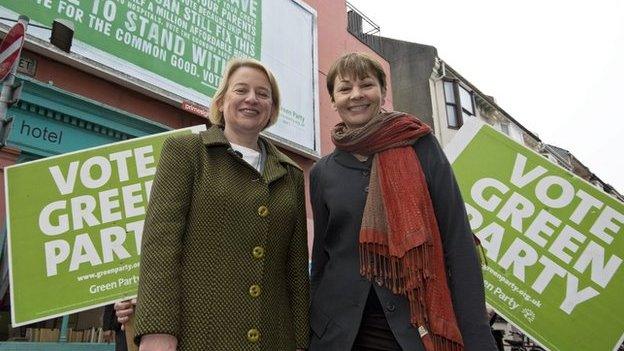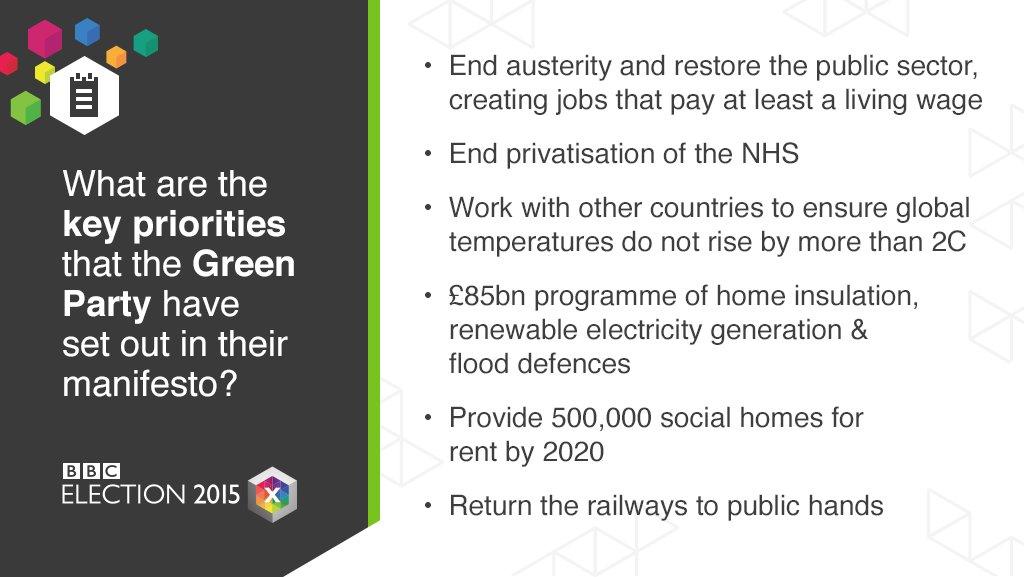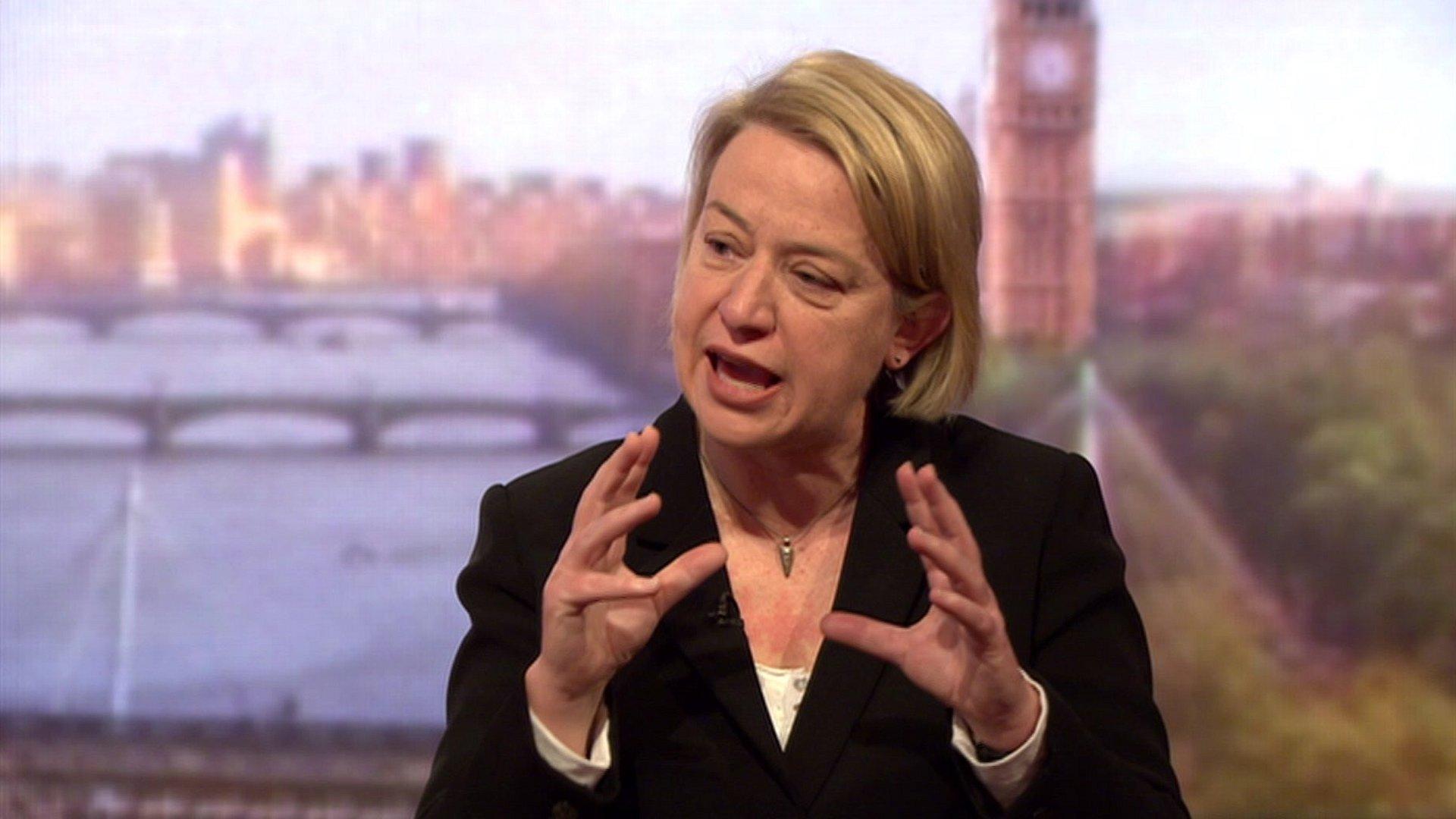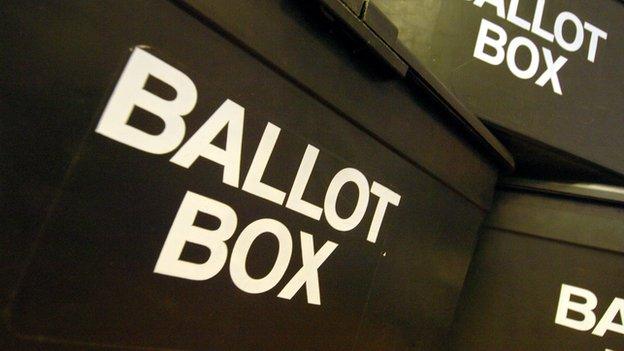Election 2015: Greens urge voters - 'join a revolution'
- Published
- comments

The Green Party launched its General Election manifesto with a call for a "peaceful political revolution" to end austerity and tackle climate change.
It pledged to stop the "creeping privatisation of the NHS" and increase the minimum wage to £10 an hour.
Leader Natalie Bennett and Caroline Lucas, the party's only ever MP, unveiled a plan to help the two million children growing up in cold homes.
They want an insulation programme for the worst-affected nine million homes.
Introducing the manifesto at the Arcola Theatre in Dalston, east London, Ms Bennett said it represented a "genuine alternative" to "business as usual politics".
She said she wanted to "take back" the NHS and the railways from the private sector.
The 84-page manifesto, entitled "For the common good" sets out the Greens' main policy pledges, including:
Creating one million jobs that pay at least a living wage
60% rate of income tax on those earning more than £150,000 a year
A new wealth tax on the top 1%; a "Robin Hood tax" on the banks
Banning fracking; investment in renewable energy
Scrapping university tuition fees
Cutting rail fares by 10%
Abolishing the bedroom tax
The Greens are fielding a record number of candidates - 571 - on 7 May and claim a surge in membership numbers to 59,000 - more than UKIP and the Lib Dems.
Natalie Bennett: "At the heart of this manifesto is a vision of a fair economy"
Ms Lucas said a free nationwide insulation programme to tackle cold homes, specifically in areas blighted by fuel poverty, would help two million children.
She also called for extra £1.3bn on the NHS budget to deal with the associated costs of cold homes.
Key priorities
Green
Main pledges
- End austerity and restore the public sector, creating jobs that pay at least a living wage
- End privatisation of the National Health Service
- Work with other countries to ensure global temperatures do not rise by more than 2C
- £85bn programme of home insulation, renewable electricity generation & flood defences
- Provide 500,000 social homes for rent by 2020 and control rent levels
- Return the railways to public hands

Policy guide: Where the parties stand
"We believe if we invest in insulating people's homes, we can get their fuel bills down on a permanent basis," Ms Lucas told BBC Radio 4's Today programme
"It would also get our climate-change emissions down and could create hundreds of thousands of jobs.
"And crucially, for every £1 invested in this programme, it's estimated that £1.27 comes back to the economy in terms of the benefit in jobs and reduction on the NHS bill."
Ms Lucas said the government had "a woeful record on energy insulation", with the installation of energy-efficient measures in UK homes falling by 80% over the last two years.
The Green Party has called for a "progressive alliance" with the SNP, if it has MPs at Westminster in the next Parliament.
Ms Lucas ruled out backing a Conservative government, but said Green MPs could support a minority Labour administration on "a case-by-case basis".

Analysis, by Laura Kuenssberg, Newsnight chief correspondent
The Green Party's manifesto is full of big promises: a pension of more than £300 a week for a couple, renewable energy taking over from fossil fuels, a million new public sector jobs.
But they are having difficulty defending their numbers robustly. They claim they'll raise a massive £30bn extra from clampdowns on tax avoidance; very, very optimistic. And the man behind the manifesto's numbers, Brian Heatley, told me they couldn't really be sure how much their new wealth tax would raise because it hasn't been tried before.
They say they could make up any shortfall by reducing their planned cut to employers' national insurance contributions.
In one sense, refreshingly candid. In another way, extremely problematic for a party that wants to be taken seriously on a tax that they need to raise £20bn.
The Greens also say they would carry on spending more each year than the government gets from revenue. Does that mean deficits for ever? The party won't say.
In other news, Natalie Bennett has told Newsnight they don't want to ban the Grand National after all - more straightforward than working out government spending.

"That would give us a real opportunity to push Labour on the policies we know the public wants and which are at the heart of our manifesto," she said.
"Whether that's scrapping nuclear weapons or reversing the privatisation in our NHS, whether that's returning local schools to local control or bringing rail back into public ownership."
'Scrap road building'
Recently, Ms Bennett said the party's policy of a Citizens' Income of £72 a week for every adult in Britain would feature in the manifesto, but that it would take longer than one parliament for it to be implemented.
The cut in public transport fares would be paid for by scrapping new road-building programmes, while the party is also expected to pledge free social care for the elderly.
At the weekend, Ms Bennett said the 60% top rate of tax would apply to people earning over £150,000 and that it would raise £2bn a year.
Subscribe to the BBC Election 2015 newsletter, external to get a round-up of the day's campaign news sent to your inbox every weekday afternoon.
- Published12 April 2015

- Published10 April 2015
